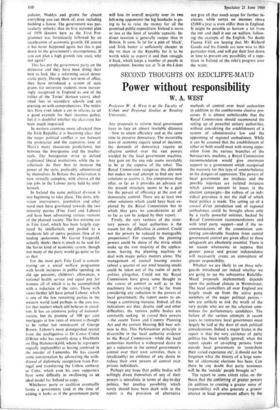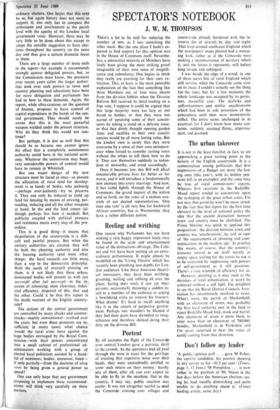Power without responsibility
SECOND THOUGHTS ON REDCLIFFE-MAUD W. A. WEST
Professor W. A. West is at the Faculty of Urban and Regional Studies at Reading University.
Any proposals to reform local government have to face an almost insoluble dilemma —how to attain efficiency and at the same time to preserve democracy. The inexorable laws of economy require speed of decision; the demands of democracy require an effective control over the vast powers wielded by the local government machine.
Any gain on the one side seems inevitably to be at the expense of the other. The Royal Commission recognises the dilemma but makes no real attempt to find any new solutions to resolve it. The compromise they offer, so far as it provides an advance on the present structure, seems to be a gain for the pursuit of efficiency at the cost of democratic control. There are at least two other solutions which could have been ex- plored by the Royal Commission but to which they gave no consideration at all so far as can be judged by their report.
Firstly, the very vastness of the statu- tory powers of local authorities is the reason for the difficulties in control. Could not the powers be reduced to manageable proportions? For example, the planning powers could be shorn of the trivia which make up the vast majority of the applica- tions, leaving the planning machine to deal with major policy matters alone. The management of council housing estates (about a quarter of our total housing stock) could be taken out of the realm of party politics altogether. Could not the Royal Commission have given some thought to the extent of control as well as to the machinery for exercising it? So far from considering any reduction in the powers of local government, the report seems to en- visage a continuing increase. Indeed, all the indications are that, despite staff and other difficulties, the various public bodies are constantly seeking to extend their powers —the recent Town and Country Planning Act and the current Housing Bill bear wit- ness to this. This Parkinsonian principle is discernible in the local authority evidence to the Royal Commission—while the local authorities manifest a widespread desire to get a reduction in the central government's control over their own activities, there is (predictably) no evidence of any desire to reduce their own powers of control over private individuals.
Perhaps any hope that public bodies will willingly divest themselves of any of their powers is unrealistic in terms of day-to-day politics, but another possibility which surely should have been dealt with in the report is the provision of alternative
methods of control over local authorities in addition to the cumbersome elective pro-
cesses. It is almost unbelievable that the
Royal Commission should recommend the setting up of powerful unitary authorities, without considering the establishment of a system of administrative law and the appointing of regional ombudsmen. While it can be assumed that the establishment of either or both would meet with strong oppo- sition from the various branches of the bureaucratic machine, a Royal Commission recommendation would give enormous support to a government which recognised the necessity for this type of counterbalance to the dangers of oppression. The powers of local government are insidious and the
possible injustices are isolated instances which cannot amount to issues in the election campaigns—the redress of an indi- vidual grievance is not the stuff of which local politics is made. The setting up of a conseil d'etat jurisdiction and of regional ombudsmen could be brought about only by a really powerful minister, backed by Royal Commission recommendations and with total party support—and if the re- commendations of the commission con- ferring considerable freedom from central government control are given effect to these safeguards are absolutely essential. There is no reason whatsoever to suppose that greater power and greater independence will necessarily create an atmosphere of greater responsibility.
Whether we are likely to see these safe- guards introduced (or indeed whether we are going to see the substantive Redcliffe- Maud proposals implemented) depends upon the political climate in Westminster. The local councillors all over England are largely made up from the active • party members of the major political parties— MPS are unlikely to risk the wrath of the very people who are on the selection com- mittees for parliamentary candidates. The failure of the various attempts in recent years to restructure local government must largely be laid at the door of such political considerations. Indeed a major hiatus in the report is that the very existence of party politics has been totally ignored; when the report speaks of co-opting persons from outside local government to 'contribute their varied experience etc', it-should not be forgotten what the history of a large num- ber of aldermanic elections has been. Can there be any doubt that party nominees will be the 'outside' people brought in?
The report to some extent relies on the thesis that the conferring of greater powers (in addition to creating a greater sense of responsibility) will also generate a greater interest in local government affairs by the
ordinary electors. One hopes that this may be so, but again history does not seem to support it; one only has to compare the enthusiasm and involvement at the parish level with the apathy of the London local government voter. However, there may be very little to be done about this except to adopt the sensible suggestion to have elec- tions throughout the country on the same day and thus give a certain dramatic focus to them.
There are a large number of loose ends in the report—for example it recommends strongly against delegated powers, but, as the Commission must know, the pressures over recent years (after the larger author- ities took over such powers as town and country planning and education) have been for more delegation and parliament has had to bow to these demands. Again, the report, while ultra-cautious on the question of finance, proposes to leave control of capital expenditure in the hands of the cen- tral government. They should surely be aware that this is the most powerful, weapon wielded under the present structure. Why do they think this would not con- tinue?
But perhaps, it is just as well that this should be so because one cannot ignore the effect that a completely autonomous authority could have in the national econ- omy. Whatever the commission may hope, very considerable powers of control would have to remain in Whitehall.
But one major danger of the new structure must be faced at once—at present the allocation of rural land for develop- ment is in hands of bodies who jealous,* —perhaps over-jealously—try to preserve it. They can only be induced to yield up land for housing by means of coaxing, per- suading, inducing and all the other weapons at hand. In the end the land comes (al- though perhaps less than is needed). But , publicity coupled with political pressure and resistance meets every step of the pro- cedure.
This is a good thing—it means that despoilation of the countryside is a diffi- cult and painful process. But when the unitary authorities are created, they will be both the planning authority and also the housing authority (and most other things: the local councils are little more than a sop to the democratic principle). With the needs of overspill pressing on them, is it not likely that these urban- dominated bodies will present us with fait accompli after fait accompli—in the in- terests of rehousing, slum clearance, indus- trial efficiency, dispersal of this, that and the other. Could it be that this report is the death warrant of the English country- side?
The actions of the central government are controlled by many checks and counter- checks—mainly conventional—evolved over the years, but even these processes are in- sufficient in many cases; what chance would the rural areas have against the huge bodies envisaged by the Royal Com- mission—with their powers concentrated into a small cabinet of professional ad- ministrators working with a group of elected local politicians assisted by a hand- ful of nominees; bodies, moreover, freed— if only partially—from the doctrine of ultra vires by being given a general power to spend?
One can only hope that any government proposing to implement these recommend- ations will think very carefully on these matters.







































 Previous page
Previous page